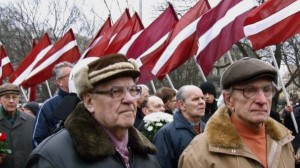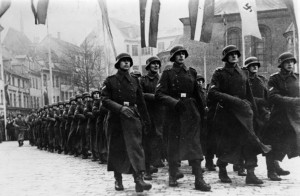
Latvian Legionnaire veterans parade in Riga on March 16, 2009. While the event has been peaceful in recent year's, the commemoration of the collaboration with Nazi Germany stokes ethnic tension in the small Baltic state.
RIGA — Riga Mayor Nils Ušakovs is hoping to forbid the annual Legionnaire procession on March 16 and has reportedly contacted the State Police as he searches for legal basis to ban the event, according to Latvian media.
TV3 reported on Sunday that the Riga City Council currently sees no formal reason not to allow the procession of WWII veterans and their supporters, so Ušakovs turned to [private_supervisor]State Security Police Chief Jānis Reiknis in the hope of finding a weighty argument that would give the council basis to refuse permission.
The annual march, from Riga Cathedral in Old Town to the Freedom Monument, is a catalyst for historic prejudice and animosity, with nationalist Latvians insisting that they are simply honoring those killed in battle, while Russians claiming the procession points to a rise of fascism in the Baltic state.

The Latvian Legion of the Waffen-SS marches in Riga in 1943. The legacy of Latvian collaboration with the Nazis against the Soviets remains a point of contention more than 60 years later.
This year, however, the situation is nuanced in that Riga has an ethnic Russian mayor who adheres to the typical Russian viewpoint on Latvian history: there was no occupation after World War II and the Latvians who belonged of the Waffen SS legion, the Legionnaires, were lackeys of the Third Reich. The Baltic states were taken over by the Soviet Union in 1939 only to be occupied by the Germans during the subsequent Nazi invasion of the U.S.S.R. Some Latvians viewed the Nazis as liberators.
Ušakovs defended his decision to turn to police authorities since he was obligated to find out whether, by allowing the procession to take place, there would be any threats to Riga citizens.
Others see an ulterior motive behind the mayor’s actions.
“I suppose Mr. Ušakovs would say that formally he is interested in maintaining public order in Riga, but as a politician I see this as political pressure on the Security Police to obtain favorable outcome,” Minister of the Interior Linda Murniece told TV3.
The last several years the procession has taken place without violence, thanks to a massive police presence.[/private_supervisor] [private_subscription 1 month]State Security Police Chief Jānis Reiknis in the hope of finding a weighty argument that would give the council basis to refuse permission.
The annual march, from Riga Cathedral in Old Town to the Freedom Monument, is a catalyst for historic prejudice and animosity, with nationalist Latvians insisting that they are simply honoring those killed in battle, while Russians claiming the procession points to a rise of fascism in the Baltic state.

The Latvian Legion of the Waffen-SS marches in Riga in 1943. The legacy of Latvian collaboration with the Nazis against the Soviets remains a point of contention more than 60 years later.
This year, however, the situation is nuanced in that Riga has an ethnic Russian mayor who adheres to the typical Russian viewpoint on Latvian history: there was no occupation after World War II and the Latvians who belonged of the Waffen SS legion, the Legionnaires, were lackeys of the Third Reich. The Baltic states were taken over by the Soviet Union in 1939 only to be occupied by the Germans during the subsequent Nazi invasion of the U.S.S.R. Some Latvians viewed the Nazis as liberators.
Ušakovs defended his decision to turn to police authorities since he was obligated to find out whether, by allowing the procession to take place, there would be any threats to Riga citizens.
Others see an ulterior motive behind the mayor’s actions.
“I suppose Mr. Ušakovs would say that formally he is interested in maintaining public order in Riga, but as a politician I see this as political pressure on the Security Police to obtain favorable outcome,” Minister of the Interior Linda Murniece told TV3.
The last several years the procession has taken place without violence, thanks to a massive police presence.[/private_subscription 1 month] [private_subscription 4 months]State Security Police Chief Jānis Reiknis in the hope of finding a weighty argument that would give the council basis to refuse permission.
The annual march, from Riga Cathedral in Old Town to the Freedom Monument, is a catalyst for historic prejudice and animosity, with nationalist Latvians insisting that they are simply honoring those killed in battle, while Russians claiming the procession points to a rise of fascism in the Baltic state.

The Latvian Legion of the Waffen-SS marches in Riga in 1943. The legacy of Latvian collaboration with the Nazis against the Soviets remains a point of contention more than 60 years later.
This year, however, the situation is nuanced in that Riga has an ethnic Russian mayor who adheres to the typical Russian viewpoint on Latvian history: there was no occupation after World War II and the Latvians who belonged of the Waffen SS legion, the Legionnaires, were lackeys of the Third Reich. The Baltic states were taken over by the Soviet Union in 1939 only to be occupied by the Germans during the subsequent Nazi invasion of the U.S.S.R. Some Latvians viewed the Nazis as liberators.
Ušakovs defended his decision to turn to police authorities since he was obligated to find out whether, by allowing the procession to take place, there would be any threats to Riga citizens.
Others see an ulterior motive behind the mayor’s actions.
“I suppose Mr. Ušakovs would say that formally he is interested in maintaining public order in Riga, but as a politician I see this as political pressure on the Security Police to obtain favorable outcome,” Minister of the Interior Linda Murniece told TV3.
The last several years the procession has taken place without violence, thanks to a massive police presence.[/private_subscription 4 months] [private_subscription 1 year]State Security Police Chief Jānis Reiknis in the hope of finding a weighty argument that would give the council basis to refuse permission.
The annual march, from Riga Cathedral in Old Town to the Freedom Monument, is a catalyst for historic prejudice and animosity, with nationalist Latvians insisting that they are simply honoring those killed in battle, while Russians claiming the procession points to a rise of fascism in the Baltic state.

The Latvian Legion of the Waffen-SS marches in Riga in 1943. The legacy of Latvian collaboration with the Nazis against the Soviets remains a point of contention more than 60 years later.
This year, however, the situation is nuanced in that Riga has an ethnic Russian mayor who adheres to the typical Russian viewpoint on Latvian history: there was no occupation after World War II and the Latvians who belonged of the Waffen SS legion, the Legionnaires, were lackeys of the Third Reich. The Baltic states were taken over by the Soviet Union in 1939 only to be occupied by the Germans during the subsequent Nazi invasion of the U.S.S.R. Some Latvians viewed the Nazis as liberators.
Ušakovs defended his decision to turn to police authorities since he was obligated to find out whether, by allowing the procession to take place, there would be any threats to Riga citizens.
Others see an ulterior motive behind the mayor’s actions.
“I suppose Mr. Ušakovs would say that formally he is interested in maintaining public order in Riga, but as a politician I see this as political pressure on the Security Police to obtain favorable outcome,” Minister of the Interior Linda Murniece told TV3.
The last several years the procession has taken place without violence, thanks to a massive police presence.[/private_subscription 1 year]
— This is a paid article. To subscribe or extend your subscription, click here.












